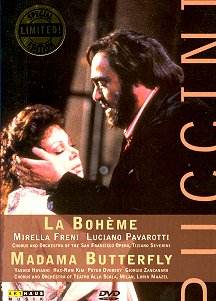Packaged conveniently as a cheap double DVD set,
these two discs should do well in the general music lovers market.
Both productions are safe, reliable and thoroughly traditional,
with no hint of controversy or ‘boat-rocking’ to upset anyone.
I have lived with the Bohème for some time now,
having bought it on its first video release in 1989. With sharper
picture and infinitely better sound quality, there is obvious
enjoyment to be had, though the same irritations I have always
had are still there. These centre on the tiresomely outdated practice
of curtain calls after every act, as well as thunderous applause
for every ‘big’ aria or set piece. It’s doubtful whether any modern
theatre director worth their salt would allow this, as it seriously
disrupts dramatic flow and credibility, and gets worse on repeated
viewings. At least the singers hold their poses during the rapturous
clapping, and they are obviously from performing traditions where
this happens a lot. But compared with, say, Baz Luhrmann’s grippingly
provocative Sydney production, set in the 1950s and with vibrant
young singers (now wowing Broadway and in serious need of transfer
to DVD), this all seems a mite quaint and old fashioned. Still,
there is much to enjoy, with the starry cast in good voice and
very experienced in their roles.
Compared to his classic recording with Karajan,
Pavarotti sounds a bit strained in places, and he has his big
Act 1 aria ‘Che gelida manina’ transposed down a semitone, something
that was to become an all too familiar trend in his later stage
performances.
Mirella Freni, his long time friend and singing
partner, is on good form, though she too is less ‘free’ in the
top registers than she had been on the Karajan set.
Characterisation is, however, spot on, and the
tender duets are meltingly memorable. Act 3 is particularly impressive,
where Puccini’s superb orchestration and flawless dramatic grip
are well realised by cast and director. Conducting throughout
is disciplined and tight, though after hearing Serafin, Beecham
or Karajan, it sounds a touch workmanlike. Booklet notes are perfunctory,
and it is a great pity that the original, provocative essay by
the much-missed William Mann, entitled ‘Puccini’s Hymn to Youth’,
has gone.
The Butterfly disc has tighter conducting
from Maazel, who on his day can be as dramatically incisive as
anyone. This production aims at a sort of ‘authenticity’, being
based around Japanese prints and silhouettes, and having two Japanese
leads as Cio-Cio San and Suzuki. Yasuko Hayashi’s portrayal of
‘little Butterfly’ is perhaps a bit on the serious side (even
dour at times) but it does make theatrical sense, and it plays
nicely alongside Dvorsky’s charlatan Pinkerton. Both are in excellent
voice, and Maazel paces the score to suit the ebb and flow of
the tension, expanding majestically for the long Act 1 duet. It
is not quite as probing a production as the recent Covent Garden
one, but is an eminently ‘safe’ bet for the money.
In fact, this double pack is hard to beat for
value, and the lack of extras has to be set against its cheap
price. Aficionados of the composer may be waiting for more searching
productions, but until they come along, these will do very nicely.
Tony Haywood
see also review
by John Leeman


![]() Chorus and Orchestra of
San Francisco Opera/Tiziano Severini
Chorus and Orchestra of
San Francisco Opera/Tiziano Severini ![]() ARTHAUS DVD 1000 056
[116 minutes]
ARTHAUS DVD 1000 056
[116 minutes] ![]()
![]() Chorus and Orchestra of
La Scala, Milan/Lorin Maazel
Chorus and Orchestra of
La Scala, Milan/Lorin Maazel ![]() ARTHAUS DVD 1000 110
[144 minutes]
ARTHAUS DVD 1000 110
[144 minutes] ![]()